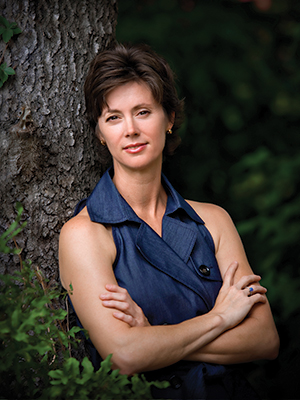WHEN MY 46-YEAR-OLD HUSBAND, RANDY PAUSCH, was diagnosed with pancreatic cancer in 2006, I took on my new role as a caregiver without trepidation. I remember thinking, “We’ll get through this and our lives will go back to normal.”

Jai Pausch Photo by Kristi A. Rines / Photography Pure and Simple.
Looking back, I obviously had some unreasonable expectations. How could I continue my regular routine of caring for our three small children, who were 4, 2 and an infant, while adding the demands of being my husband’s caregiver? At the time, I had no idea what lay ahead.
What I discovered is that getting through cancer poses unexpected challenges to the patient and caregiver alike. Over the months following Randy’s diagnosis, I would need to become fully versed in the science of his disease and its various treatment options, as well as the psychological effects of a life-threatening illness on a patient and his family. I would need to learn how to organize doctor and family visits, manage 18 different medications, clean a PICC line (a catheter inserted in the upper arm), plan nutritious meals, take blood pressure, monitor edema (swelling from excess fluid in the body), and manage pain.
Like most new caregivers, I had a steep learning curve to climb in a very short amount of time. Along the way, I learned some important lessons: to ask for assistance, to accept people’s offers to pitch in, and to not judge myself as less of a mother, wife or caregiver for it. It took me a long time to realize that by accepting help, my children and my husband benefited because I was less stressed out.
People have often asked me how they can give support to someone taking care of a loved one with cancer. Here are two suggestions (from someone who has benefited from both):
- Suggest a list of tasks you can and want to do. Can you pick up groceries? Take the kids to soccer practice? Organize a meal webpage? (Try foodtidings.com.) Help out with laundry? Don’t just say, “Call me if you need anything!”
- Offer a distraction, like a ball game or a movie, with no cancer talk. Help the caregiver take a break and feel like a normal person.
But beyond the support of family and friends, where can a new caregiver turn for guidance? In our case, Randy’s oncologist recommended a counselor, who helped me create successful strategies for addressing the emotional challenges we faced during treatment, remission, recurrence and death. Another resource was our hospice nurse, who helped us learn to handle the logistics of pain management and medications, and who provided endless support as Randy’s disease progressed.
I also learned that finding another caregiver of similar life circumstances can ease the sense of isolation many caregivers experience. My brother introduced me to a woman with two young children whose husband had a rare cancer that had metastasized to his liver. She understood exactly what I was going through: fear of widowhood and single parenthood, juggling of domestic responsibilities with medical care, confusion over treatments and side effects, and uncertainty about the future.
I could never have made it through 23 months of cancer caregiving if it had not been for the many kinds of help I received. As you face this same journey, remember: There are many helpful hands waiting to reach out and support you.
Cancer Today magazine is free to cancer patients, survivors and caregivers who live in the U.S. Subscribe here to receive four issues per year.




